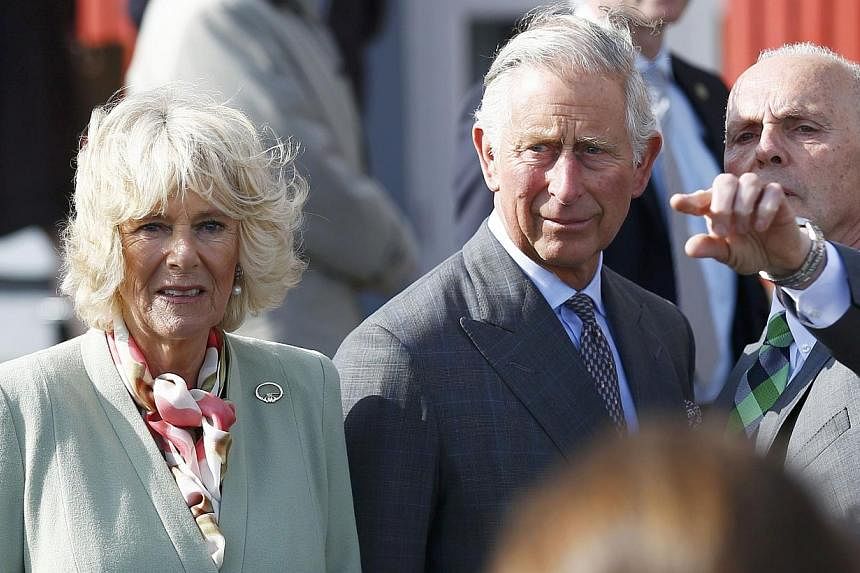MULLAGHMORE, Ireland (AFP) - Britain's Prince Charles on Wednesday spoke of his "anguish" at the murder of his godfather by IRA paramilitaries in 1979 as he became the first royal to visit the assassination site in Ireland.
Charles remembered Lord Louis Mountbatten as "the grandfather I never had" on an emotional trip to the rugged coastline, saying he understood the suffering of the Irish people in "a profound way".
The British Union Jack flag and the Irish tricolour flew side by side on the main street in Mullaghmore, the seaside village from where Mountbatten and his family set off on a boat which was later blown up by an Irish Republican Army (IRA) bomb.
Under an overcast sky, Charles and his wife Camilla toured the site under heavy security as boats patrolled the bay and a helicopter hovered overhead.
"At the time I could not imagine how we would come to terms with the anguish of such a deep loss," Charles told an audience in the nearby town of Sligo before the visit.
"Through this dreadful experience I now understand in a profound way the agonies borne by others on these islands of whatever faith or political persuasion."
Mountbatten, Charles' great-uncle, his mother Queen Elizabeth II's cousin and the last viceroy of British-ruled India, was 79 when he was killed.
Two relatives, one of them Charles' teenage godson, and a 15-year-old local boy also died in the attack.
Mountbatten's grandson, Timothy Knatchbull, who survived the blast but whose 14-year-old twin brother Nicholas was killed, met Charles in Mullaghmore along with local resident Peter McHugh, who helped bring the bodies ashore.
'SYNONYMOUS WITH VIOLENCE'
Michael McHugh, who was a young boy at the time of the attack and is now editor of the local Donegal Post newspaper, remembered the day of the bombing.
"There was an awful lot of activity down at the pier which I later realised was probably bodies being taken from the sea," he told AFP.
"To me it's a rounding of the circle and something I didn't think would happen but it's very important for the peace process."
There has been a gradual process of reconciliation since the 1998 Good Friday Agreements which formally put an end to three decades of civil unrest known as The Troubles in which 3,500 people died.
In a further sign of thawing relations, the 66-year-old heir to the throne on Tuesday became the first royal to meet Irish republican leader Gerry Adams, the leader of Sinn Fein, the political arm of the now defunct IRA.
A few hours after the Mullaghmore attack, 18 British soldiers were killed in an IRA ambush across the border in Northern Ireland, in one of the deadliest days of the conflict.
Relatives of some of those soldiers attended a "peace and reconciliation" ecumenical church service along with Charles and Camilla in nearby Drumcliffe earlier on Wednesday.
Singing in the choir was 17-year-old Bethany McLoughlin, whose grandfather Gerard McKinney was among the 13 people shot dead by British soldiers in the Bloody Sunday massacre in 1972.
"For many years, wherever one went in Europe, Ireland was synonymous with violence," said Catholic bishop Kevin Doran.
'WE ALL HAVE REGRETS'
Charles and his wife have been met with crowds of cheering onlookers during their two-day visit to Ireland, as well as a small protest on Tuesday.
His handshake with Adams came after the historic meeting in 2012 between Queen Elizabeth II and Northern Ireland's deputy first minister, former IRA commander Martin McGuinness.
As he spoke in Sligo, Charles recalled remarks made by his mother in 2011 when she became the first British monarch to visit Ireland since it gained independence from Britain in 1922.
"We all have regrets. As my mother said at Dublin Castle, with the benefit of historical hindsight we can all see things which we would wish had been done differently or not at all," Charles said.
"I'm only too deeply aware of the long history of suffering which Ireland has endured.
"The recent years have shown us that healing is possible."
Ahead of the Mullaghmore visit, Charles and Camilla also paid their respects at the grave of famed Irish poet W.B. Yeats, who died in 1939.
Charles recalled one of Yeats' verses, where he wrote that "peace comes dropping slow".
"As a grandfather myself, I pray that his words can apply to all those who have been so hurt and scarred by the troubles of the past," he said.

